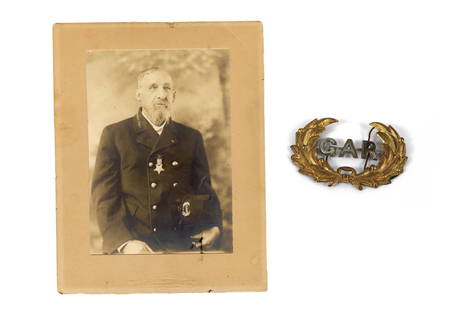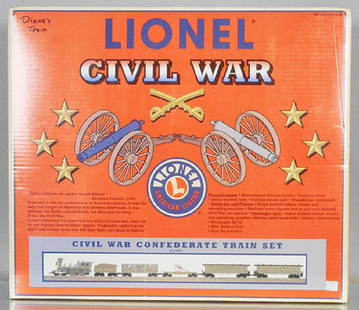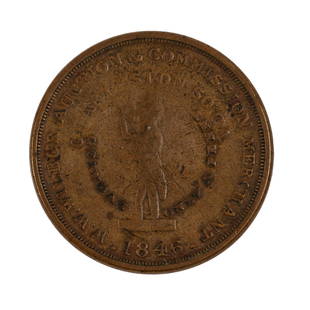
Civil War Veteran Captures Train Robbers in Missouri
Similar Sale History
View More Items in Militaria & War MemorabiliaRelated Militaria & War Memorabilia
More Items in Militaria & War Memorabilia
View MoreRecommended Collectibles
View More










Item Details
Description
Civil War Veteran Captures Train Robbers in Missouri
“Let me congratulate you, on doing the most thorough and quickest work of greater service, benifit, and the greatest good to the honor and good name of the state of Missouri, that any man in it, has ever done.”
[WILLIAM E. CHESTER], Small archive of letters and photographs, 1878-1899. 6 pp. total + 4 photographs.
This small archive consists of photographs and letters related to William E. Chester, who served as a special agent for a Missouri railroad in the 1890s and led a posse to capture train robbers in 1899.
Contents and Excerpts:
Four photographs of Chester, three by photographer William T. D’Ole in Fort Scott, Kansas (including a duplicate); in two, he is wearing a hat and overcoat. 4.25ʺ x 6.5ʺ to 5.25ʺ x 8.5ʺ.
J. R. Attebery to “Miss Budd,” Autograph Letter Signed, March 29, 1878, Wellington, Missouri. 2 pp., 4.25ʺ x 6.5ʺ. Tears on fold.
“Absent friend I have written you two letters since the first of January, and have not received an answer yet I would like to know if you got them or not.”
This letter is likely addressed to Mary Matilda Budd, Chester’s second wife, two or three years before their marriage.
Chauncey McKeever to William E. Chester, Letter Signed, December 28, 1883, Washington, D.C. 1 p., 8ʺ x 10ʺ.
“In accordance with your application of the 17th instant, I herewith transmit your discharge certificate as a member of company E 29th Missouri Mounted Volunteers to date the 27th January 1862 by reason of regiment having failed to complete its organization.”
Henry W. Thieman to William E. Chester, Autograph Letter Signed, January 7, 1899, Concordia, Missouri. 1 p., 8.5ʺ x 11ʺ. Expected folds, with minor edge tears.
“The K. C. Journal, had the news of that Robbery in it, morning after it happened. Same stated that you were on train, watched the Robbers at their work, and made up a Posse to capture them. Told our Marshall (Wm Brackmann), that the Robbers would be captured.
“In this evenings ‘K.C. Star’ I see that you have them and sent for Mr. Cravens, to assist in prosecuting them. Please accept my hearty congratulations, in your successful effort. Hope you will succeed in sending every one to the Pen or Gallows, as you did the man Hamilton at Warrensburg, who robbed our store, and threatened to kill me, as soon as he came back from the Pen, where I had succeeded in sending him; but killed another German which cost him his life on the Gallows.”
Henry W. Thieman to William E. Chester, Autograph Letter Signed, January 7, 1899, Concordia, Missouri. 2 pp., 8.5ʺ x 11ʺ. Expected folds, with tears on some tears, but no loss.
“When the ‘Star’ (‘K.C. Star’) brought the news that the Bandits who robbed the train, were arrested, I wrote you a letter, congratulating you on your work, but made the mistake of addressing same to you at ‘Macomb,’ which as now understand it, is only a switch station not a Post Office. Let me congratulate you, on doing the most thorough and quickest work of greater service, benifit, and the greatest good to the honor and good name of the state of Missouri, that any man in it, has ever done. Such work, by speedy arrest, and bringing such criminals to the ‘Bar of Justice’ is what counts. To Hell with Mob Law! The trial of Guiteau and the Chicago Anarchists—and Pendergast—is worth a thousand Mobs. It is quite interesting for me, to learn, that Ryan is in it. He is one of the 3 parties, that robbed our Bank, on Aug. 28, 1878. He is the man who held the sack open, into which Cashier Henry Ficken, had to throw the $4,260. Took Stan Feagan and William Ray, who saw Ryan when he committed the act—with the sack; to Kansas City, after he was convicted of the Glendale Robbery, and they identified him, as being the man with the sack & money. So did Ficken at another time. Had them before Grand Jury at Lexington in Oct. 1881, and there must be an Indictment existing on their evidence. The Red hair, is what bothers me, as near as I remember his hair was of dark or auburn color. As to Kennedy, it is quite interesting to read how the Quail hunter faced his pals, at Breakfast table, yesterday.
“Believe and trust, they will receive fair trial, and swift justice will be meted out to them—there—where Jackson County Dem. official influence and the influence of their Dem. friends, will not count as in Jackson County—but where they will be covered with shame and disgrace, as Conspirators after the fact—if not before—and the Culprits receive justice according to the Laws of this state. Again let me congratulate you, hoping that the R. R. Co. will duly recognize your good work, and duly reward you for same; for it is a ‘feather in their cap,’ and a grand inducement for a travelling public, to travel on that Road. Worth hundreds of thousand dollars, to the Road in business and good name.”
Historical Background:
On August 29, 1878, three men robbed the Concordia Savings Bank in Concordia, Missouri, forcing cashier Henry Ficken to put more than $4,000 in a sack. The sheriff and a posse soon apprehended Ottho Offut, Thomas Renick, and Joseph M. (Riley) Correll, and they were charged with the crime. At a trial the following month, the judge acquitted Offut, Renick, and Correll, when witnesses testified that they were elsewhere at the time of the robbery. In October, authorities arrested Abe Cresswell, John Shewalter, and Ed Shewalter for the crime, but they were also discharged when the detective who identified them failed to appear in court.
The difficulty of convicting criminals in Jackson County, which included Kansas City, was exacerbated by divisions between local Democrats and German immigrants, who generally supported the Republican Party. Henry W. Thieman (1843-1934) was born in Hanover, Germany and came to Missouri with his family in 1845. He settled in Concordia, fifty-five miles east of Kansas City, where he became a justice of the peace in 1870 and served in that capacity for decades. He was also president of the Concordia Savings Bank.
On January 3, 1899, six masked men robbed a passenger train on the Kansas City, Fort Scott & Memphis railroad, about forty-five miles east of Springfield, Missouri. They used dynamite to break into a “through express safe” that could only be opened at transfer stations. According to a newspaper report the following day, “Captain W. E. Chester, special agent for the Memphis road, started on the trail of the robbers last night with five mounted men, armed with Winchesters and revolvers. The place where the holdup occurred is in the center of a rough, uninhabited country and there is little chance of catching the robbers.” Five days later, the newspaper reported that “The preliminary hearing of the five men charged with holding up and robbing a Memphis passenger train near Macomb, Mo., last Tuesday night is being held today at Mansfield, Mo. W. E. Chester, special agent of the Memphis railway, who captured them with a posse last Friday says he has sufficient evidence to bind them over to the grand jury for indictment. If the men are convicted they may be hanged as train robbery is a capital crime in the state of Missouri.”
One of the men arrested made a complete confession and declared that Jack Kennedy (ca. 1870-1922), described as “the West’s last notorious train robber,” had planned and led the robbery. His nickname was “the Quail Hunter.” Another participant was William “Bill” Ryan (b. ca. 1851), using the alias Bill Jennings, who had been a part of the James gang and had helped rob a train in Glendale, Missouri, in 1879. Ryan was convicted of that robbery in 1881 and sentenced to 25 years in the Missouri State Penitentiary in Jefferson City. He was released in 1889.
In June 1899, a jury in Wright County convicted Kennedy and sentenced him to seventeen years in prison. The jury also convicted Ryan and sentenced him to twenty years in prison and two others to lesser terms. The state dismissed its case against the confessor. Kennedy was released after serving twelve years. He was killed by authorities after robbing another train in Missouri in 1922.
William E. Chester (1839-1928) was born in Illinois, and he married Mary Matilda Redfern (1841-1878) in 1860, and they had five children. That year, Chester was a wagon maker in Johnson County, Missouri. In August 1861, he joined the 27th Missouri Mounted Infantry (Union) as a first sergeant for three years. He was captured at the First Battle of Lexington on September 20, 1861. He later apparently served as captain of Company D in the 77th Missouri Militia. In 1880 or 1881, after the death of his first wife, he married Mary Matilda Budd (1857-1956), and they had four children. In the 1890s, he worked as a special agent for the Kansas City, Fort Scott, and Memphis railroad. He died in Warrensburg, Missouri.
This item comes with a Certificate from John Reznikoff, a premier authenticator for both major 3rd party authentication services, PSA and JSA (James Spence Authentications), as well as numerous auction houses.
WE PROVIDE IN-HOUSE SHIPPING WORLDWIDE.
Buyer's Premium
- 25%
Civil War Veteran Captures Train Robbers in Missouri
Shipping & Pickup Options
Item located in Westport, CT, usPayment

Auction Curated By





























![[CIVIL WAR, VETERAN'S ORGANIZATIONS]. GAR Belt Plate with Woven Waist Belt w/ Sword Hangers: Brass GAR belt plate with woven belt with sword hangers with brass hardware. Belt plate approx. 48 inches in length. [Civil War, Union, Confederate, Veteran's Organizations, GAR, Grand Army of the Rep](https://p1.liveauctioneers.com/7226/305222/164413214_1_x.jpg?height=310&quality=70&version=1700181800)






![[CIVIL WAR] 2nd Texas Cav. 1864 ALS: Autograph letter signed by R.A. Knox, 2nd Texas Infantry, to his father. Camp Crump, [Louisiana], 17 April 1864. 2 pages, 4to. A short letter written to his father, Knox notes that "The detail that wa](https://p1.liveauctioneers.com/7226/322253/173251511_1_x.jpg?height=310&quality=70&version=1710004847)
![[Civil War] Veteran's Reunion Uniform & Hat : Uniform and hat worn by Civil War veteran Raymond Kelly of the 214th Pennsylvania Infantry to reunions and events held by the Grand Army of the Republic (GAR). The GAR was a fraternal organization com](https://p1.liveauctioneers.com/7226/325455/175169111_1_x.jpg?height=310&quality=70&version=1712370394)













![[CIVIL WAR] Quilt Signed By Veterans : Piecework cotton quilt. 75 x 63 inches. A beautiful quilt rendered in a zig zag pattern in patriotic colors of red, navy, and white. Every single white piece bears the name of a soldier with their com](https://p1.liveauctioneers.com/7226/325455/175169113_1_x.jpg?height=310&quality=70&version=1712370394)





![George Washington Signed Discharge: Partly printed discharge document signed by George Washington, as Commander in Chief of the Armies of the United States. Newburgh, [New York], 4 January 1783. 1 page, ## x ## in. Undersigned by Washin](https://p1.liveauctioneers.com/7226/322253/173251475_1_x.jpg?height=310&quality=70&version=1710004847)
![[Ambrotype] Texas Confederate Soldier: Sixth plate ambrotype. Full leatherette case. Portrait of a possible Texas Confederate soldier. A silver star device was used to pin up the brim of his light-toned headgear, a look often seen in image](https://p1.liveauctioneers.com/7226/322253/173251509_1_x.jpg?height=310&quality=70&version=1710004847)
![Captured Bowie Knife w/ Period Note of Provenance: Captured Confederate D-hilt Bowie knife. [Kenansville, North Carolina]: [Louis Froelich factory]. With original metal and leather sheath with affixed period notes. First note with only remnants. Secon](https://p1.liveauctioneers.com/7226/325455/175169154_1_x.jpg?height=310&quality=70&version=1712370394)
![[Civil War] Bullet Which Nearly Killed Soldier: Lead bullet encased in gold acorn fob with chain. Finely engraved: "W.D. Fiske / 14th Regt. C V / Fredericksburg / Dec 17, 1863." Acorn approx. 1 1/2 x 1 in. Overall length 6 1/2 in. Published in "Her](https://p1.liveauctioneers.com/7226/325455/175169103_1_x.jpg?height=310&quality=70&version=1712370394)
![[HANCOCK, John] Washington’s Spy, Officer’s Commission: Partly printed document signed by John Hancock as President of the Continental Congress, for Epaphras Bull (1748-1781). [Philadelphia, Pennsylvania], 10 January 1777. 1 page, ## x ## in. Completed in](https://p1.liveauctioneers.com/7226/322253/173251471_1_x.jpg?height=310&quality=70&version=1710004847)


![[CIVIL WAR] 1st Texas Infantry in Camp: Outdoor half plate ambrotype of the 1st Texas Infantry. Full leatherette case. Significant, large half plate ambrotype of members of the 1st Texas Infantry at ‘Splinterville,’ the regiment’s win](https://p1.liveauctioneers.com/7226/322253/173251512_1_x.jpg?height=310&quality=70&version=1710004847)
![[CIVIL WAR] Presented Ames Sword, 16th New York Light Artillery : Fine m1850 foot officer's sword presented to Lieutenant Henry C. Jackson, 27th New York Infantry and 16th New York Light Artillery. Solingen, [Germany]: W. Clauberg and Ames, Chicopee MA hallmarks. Re](https://p1.liveauctioneers.com/7226/325455/175169097_1_x.jpg?height=310&quality=70&version=1712370394)
![[CIVIL WAR] Black Soldier & Wife: CDV-sized tintype photograph WITH gem-sized tintype. Full thermoplastic case. Portrait of an unknown African American Civil War soldier who holds the rank of sergeant. He looks directly at the camera](https://p1.liveauctioneers.com/7226/322253/173251671_1_x.jpg?height=310&quality=70&version=1710004847)
![Historic Einstein Signed Program from Lincoln University Visit: Conferences on Objectives. Lincoln University, [Oxford], Pennsylvania, 3 May 1946. SIGNED BY ALBERT EINSTEIN. Tipped into Horace Mann Bond (1904-1972). The Education of the Negro in the American Socia](https://p1.liveauctioneers.com/7226/322253/173251693_1_x.jpg?height=310&quality=70&version=1710004847)






